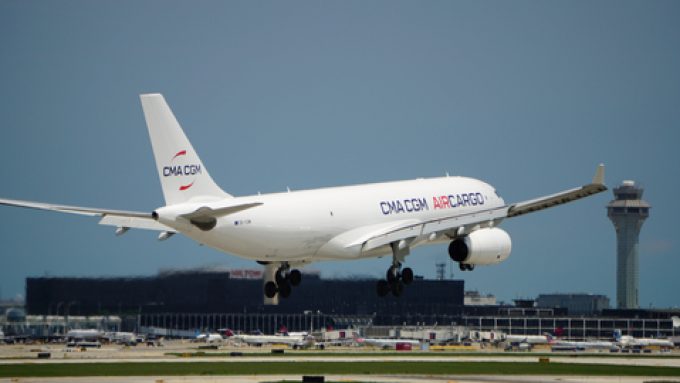CMA CGM to launch China-Mexico express shipping service
More evidence of the burgeoning direct trade between China and Mexico was on show yesterday ...

“Forwarders trust us,” insisted Damien Mazaudier, CEO of CMA CGM Air Cargo. “The market is already convinced [of our neutrality].”
CMA’s airline last week announced the launch of its transpacific services, which it has wanted for some time. Mr Mazaudier explained that the delay was, in part, because of its commercial deal with AF-KLM, which has a partnership with Delta, triggering antitrust authorities to cap further movements in the US.
“In parallel, we did not have any more aircraft at that time. We were operating aircraft to Asia, to Abu Dhabi, at that time, and Mumbai, and we didn’t have the aircraft. Now we will get aircraft – so the timing is right.”
Large customers on the transpacific route, the first of which will be Hong Kong-Anchorage-Chicago-Seoul-Hong Kong, will not include sister companies Bolloré and Ceva Logistics. No capacity is set aside for them, while they take 10% to 20% of the space on CMA’s Asia-Europe flights.
“On the transpacific route we have selected, we have a lot of other clients. Ceva and Bolloré are not necessarily our priority.”
Mr Mazaudier, speaking to The Loadstar, argued that other forwarders were not put off by CMA’s ownership of two large rivals.
“The market is already convinced. We have a name, we deploy our fleet. There is currently demand on the routes we have analysed, and we don’t try to give priority to Ceva/Bolloré. We are very neutral in our approach, especially on the routes where we estimate there is a market, and a dynamic.
“Customers trust us, they don’t believe there are any specific disclosures between the entities in the group. They are happy, we give them some capacity, we deliver the service. And I think that is the key point; we are very regular, reliable, we have sufficient frequencies to the destination where we go and clients are very happy with this.”
On the other hand, of course, CMA CGM Group’s ability to offer clients a one-stop shop must be helpful. Mr Mazaudier said the airline was “quite independent”. But, he added: “From time to time, we work with the clients of the shipping business, who are looking for solutions by air. It’s convenient.”
He explained that this has been more prevalent during the Red Sea crisis, which has seen shippers seek alternative routes.
“Some clients on the shipping side have requested air connections, or different solutions, around India, for instance.”
The air carrier currently operates two 777Fs and three A330Fs, but has a 777-200F delivering in June, another in the fourth quarter and a third early next year. It has also ordered eight A350Fs, which will begin to deliver in 2026.
Atlas Air has been tasked with operating the transpacific services with the new 777Fs on a CMI basis, after CMA launched a tender process.
“Atlas was the one that fitted our criteria, and had the traffic rights,” explained Mr Mazaudier.
Sources have noted that CMA struggled in its first years of operation, and found it costly. One major forwarder, talking off the record about the three shipping airlines, MSC, CMA and Maersk, said: “We empathise with them, because it’s hard to manage assets; it’s not easy in a market like today’s. I’ve got to imagine there’s a lot of red ink flowing around [those airlines] and, at some point, people are going have to answer for that. It’s a tough environment to run freighters, especially when you’re new to it.
“There are great freighter operators in Europe which have been doing it for a long time, know how to do it, how it works. It’s not an easy game and those planes cost you money every single day. They never stop.
“We’ve done some business with one of those three. And it worked out okay, but I think the challenge that some of them will have is the fact that they’ll try to be opportunistic and move their equipment to markets that have the highest revenue, which is hard to continue with long-term business. When a forwarder wants you to run a route from Chicago to Liège, or whatever, they depend on you in the long term and it’s hard if they think in three months you’re going to just take the bird, and put it on the transpacific. So I think that presents a commercial challenge for them as well.”
Mr Mazaudier claimed the airline wouldn’t shift services again.
“The scheduled routes we are currently positioned on, we will keep, in order to deliver service to the client – unless there is a cataclysmic event. But our routes are there certainly for the medium-term. We don’t plan to be an opportunistic company.” He added that the A330Fs may be available for charters, allowing for some flexibility.
Mr Mazaudier acknowledged that the start had been hard. He said: “From the end of 2022 to the end of 2023, the market was more difficult, although it is slightly better now.”
One of the concerns about the airline was the lack of experience, exacerbated by the recent loss of Peter Penseel. Mr Mazuadier himself was the CEO of a Monaco helicopter company, as well as being a CMA terminal executive. He only joined the airline in September.
But he said: “We have people who have more than 20 to 30 years of experience in air cargo in key positions, both commercially and operationally.
“The company is quite young and it’s in the growing stage. With people who are very experienced and qualified internally, we have a team which is competitive. Now we need to make it happen. We are quite confident for the future.”
Comment on this article